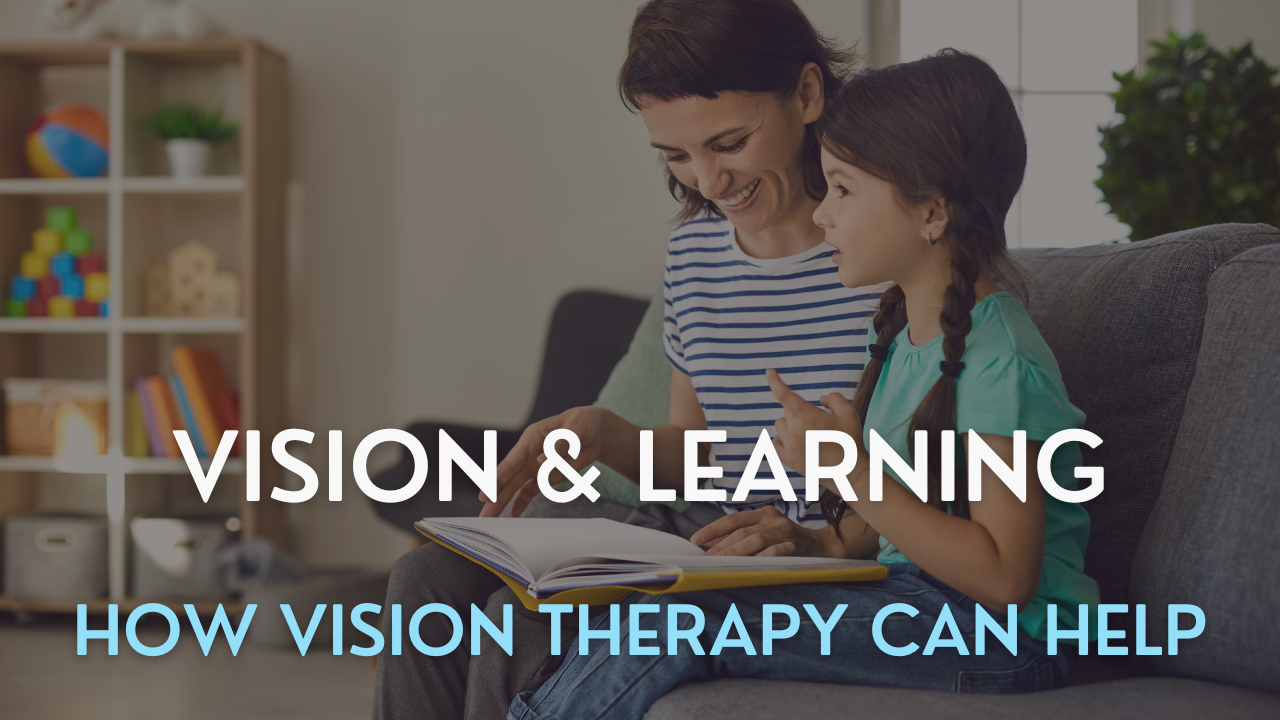Vision Therapy
Is your child struggling to keep up in school? Are they having trouble reading at grade level? Do they struggle with attention and focus? If so, your child may have a vision disorder that is affecting their learning and school performance.
Our vision therapy programs help people of all ages overcome visual challenges. Clear vision is vital for daily life, but it goes beyond just seeing well. It's about how your eyes work together, focus, and process information. Our team helps you or your loved ones overcome vision obstacles in learning, work, or play.
What is Vision Therapy?
Vision therapy is a treatment program that improves visual performance by retraining pathways in the brain. Using exercises, we can improve how well your eyes move, work together, and understand what you see. People of all ages can benefit from vision therapy to improve their quality of life and daily function.
Vision therapy treats conditions that cannot be corrected with glasses or contact lenses alone. It also helps people enhance their visual skills for activities like sports, driving, reading, and everyday tasks.
The Vision & Learning Connection
Most parents know that blurry vision can affect their child's school performance, but other vision problems can also cause trouble. Reading and close-up tasks require the eyes to focus, work together, and track properly. Learning also depends on the brain's ability to process information quickly.
These difficulties can show up as problems in reading, writing, math, spelling, sports, and social relationships. They may even look like ADHD symptoms, such as trouble with focus, attention, and memory. Research shows that children with convergence insufficiency (poor eye coordination) are three times more likely to be diagnosed with ADHD.
Research shows that treating these vision disorders can improve your child's academic performance and help them reach their full potential.
WHY CHOOSE OUR BINOCULAR VISION CLINIC?
Our team of eye doctors is highly trained to find and treat binocular vision problems. All of our doctors have completed residency training in various areas—which is voluntary, additional training for an optometrist. Dr. Maggie Francisco has special training in vision therapy & rehabilitation for binocular vision conditions. She earned Fellowship in the American Academy of Optometry (FAAO) for her research and study in binocular vision and vision rehabilitation. This training shows her expert knowledge in these specialized areas.
Skills That Can Be Improved with Vision Therapy
Vision therapy can improve key skills that are important for daily life, especially for reading and learning:
-
How well both eyes work together as a team. Poor coordination can cause double vision, eye strain, and trouble reading.
-
The ability to smoothly follow moving objects or scan across a page when reading. Problems with tracking can cause skipping lines or losing your place.
-
The ability to quickly shift focus between near and far objects, like looking from the board to your paper. Poor focusing causes blurred vision and eye fatigue.
-
Judging distances and coordinating what you see with hand movements. This affects catching balls, writing neatly, and moving through spaces safely.
-
Visualization is the ability to create mental pictures and remember visual information. This helps with spelling, math, following directions, and cognitive tasks including memory, reading comprehension, and problem solving.
-
Seeing things outside your direct line of sight. This helps with awareness of surroundings, reading efficiency, and sports performance.
Who Can Benefit from Vision Therapy?
Vision therapy can help if you or your child experience symptoms like headaches after reading, blurred vision, trouble concentrating, or reading difficulties. Children may also show signs like poor handwriting, avoiding reading tasks, or trouble with sports.
For more information on signs and symptoms, visit our Binocular Vision Clinic page.
Does vision therapy work for adults?
Absolutely! Vision therapy can help people of all ages. If these vision disorders are not treated in childhood, they don't go away on their own. Many adults have learned to work around their visual challenges. While vision therapy works best during childhood due to the brain's higher ability to change, it can still be very effective for adults. If you've had a brain or head injury, such as a stroke or concussion, vision therapy can offer valuable support and improvement.
Is vision therapy supported by research?
Yes, many research studies support vision therapy's effectiveness in treating various visual disorders. The American Academy of Optometry (AAO), American Optometric Association (AOA), and College of Optometrists in Vision Development (COVD) recognize vision therapy's effectiveness.
Studies show that vision therapy improves visual skills and performance in academics, work, and sports. It is a non-surgical alternative, and in some cases, it can improve surgical results. The COVD website offers research summaries and articles for further reading.
Additional Resources from COVD
The College of Optometrists in Vision Development (COVD) is an international group of eye care professionals dedicated to vision therapy and rehabilitation. Their website provides valuable resources for those seeking more information about vision therapy.
COVD offers informational Papers covering various aspects of vision therapy, including:
Correlation between visual disorders and dyslexia and Letter reversals
Treatment for strabismus and amblyopia (eye turn/crossed eyes/lazy eye)
These resources offer detailed information about the benefits and uses of vision therapy.

